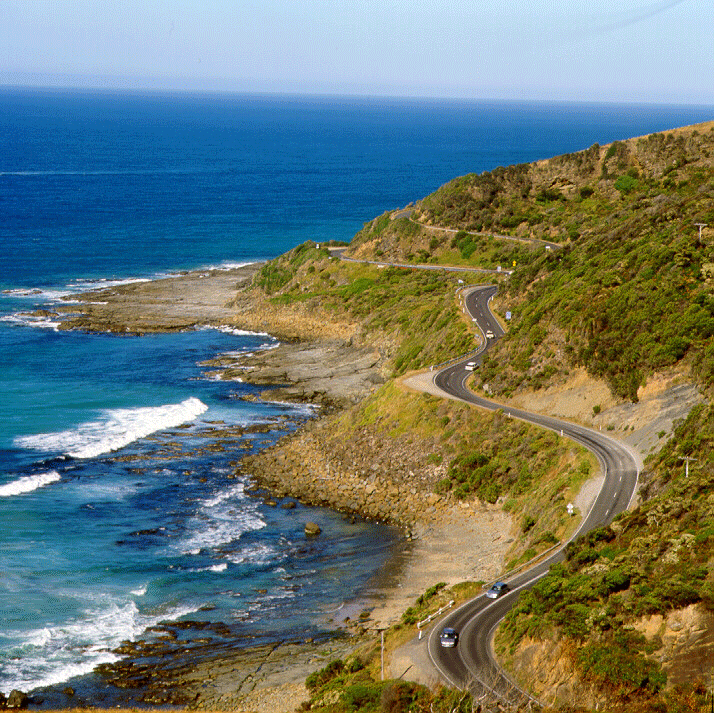
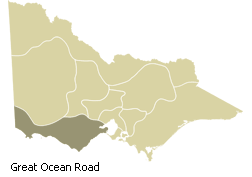
About the Great Ocean Road: The Great Ocean Road runs along the southern coastal road of Victoria. 664 km/413 miles, about 9.5 hours. One of Australia's most scenic drives, the Great Ocean Road is a magnificent three-day self-drive touring route from surf capital Torquay to the famous 12 Apostles, ending at historic fishing village Port Fairy. From here you can drive further onto Portland and then to Hamilton for a more countryside experience then over the border to Mt Gambier in South Australia onto Adelaide.
Suggested Itinerary: For a 7 day scenic drive motorhome
route:
Scenic Drive Route: Melbourne to Apollo Bay, then Apollo
Bay to Port Fairy, from Port Fairy to Portland and then to Hamilton
for a more countryside experience then over the border to Mt Gambier
in South Australia onto Adelaide.
Melbourne to Geelong (see map below)
74.9 km via M1, about 1hour and 30 minutes
Melbourne to Apollo Bay
198 km/120 miles, about 3 hours
Ease into your road trip with the leisurely drive from Melbourne
to Torquay, just over an hour's drive. Home to some of Australia's
best-known surf beaches, Torquay marks the official beginning of
the Great Ocean Road. Dose up on surf culture at the Australian
National Surfing Museum before visiting Bells Beach, host of the
annual Rip Curl Pro. Stop at nearby Anglesea and take a detour to
the golf course, famous for the kangaroos lounging under the trees
surrounding the greens. Magnificent coastal views will dominate
the next 30 kilometres as you drive to beach town Lorne, the perfect
spot for lunch – fish and chips on the beach is a must. Another
twenty minutes winding along the coastal road will bring you to
Kennett River and its most famous locals: koalas. Take some birdseed
for their flighty friends then follow the 'koala walk' with your
camera ready. As you make your way to Apollo Bay, you'll travel
up along cliff-tops offering incredible views and alongside wild
beaches – take time to stop at the lookouts for photos, or beachside
for a stroll. From coastal town Apollo Bay, follow the Great Ocean
Road into the lush Otway National Park, and turn off to the Cape
Otway light station (about a 50-minute drive). Take a tour of the
oldest surviving lighthouse in mainland Australia, climbing to the
top to see where the Bass Strait meets the Southern Ocean. Make
your way back to Apollo Bay for the night. Dine at Chris's at Beacon
Point, where gourmet food is complemented by spectacular cliff-top
views, and sleep next to the beach at Whitecrest. Or escape it all
at the Great Ocean Ecolodge, a conservation centre nestled 25 kilometres
away in the Otway National Park, for an extraordinary encounter
with native wildlife.
![]()
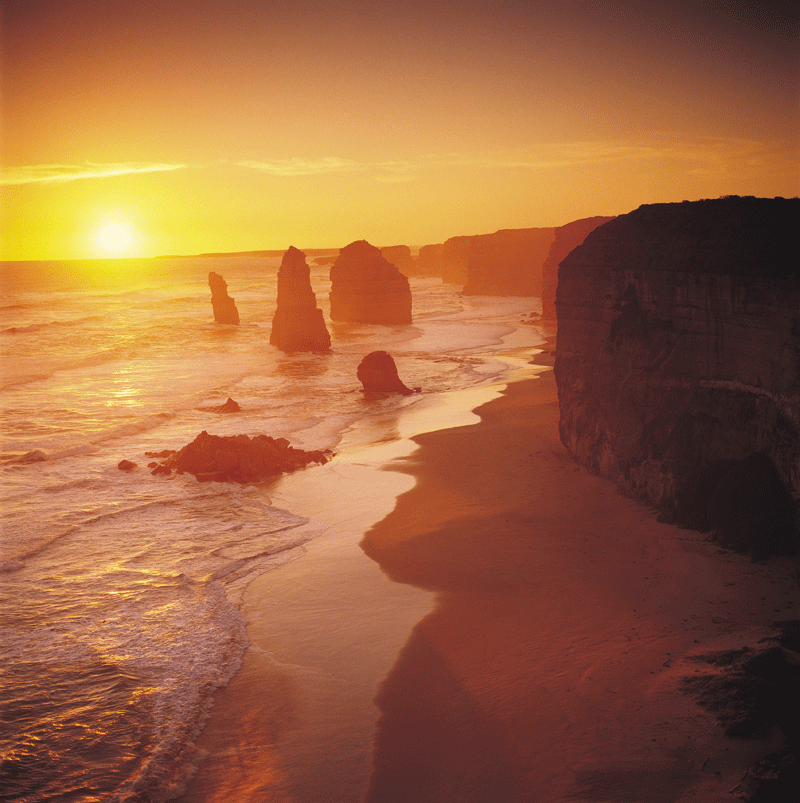
Apollo Bay to Port Fairy
189 km/117 miles, about 3 hours
From Apollo Bay, follow the Great Ocean Road into the lush rainforest
of the Otway National Park and turn off to the Otway Fly Treetop
Walk, an easy hour's drive. Reach for the sky along the treetop
canopy walkway – the longest and tallest of its type in the world
– or up the adrenaline with a zip-line tour. Back on the Great Ocean
Road, get your camera ready for the spectacular coastline leading
to Port Campbell and its famous 12 Apostles, a group of magnificent
rock stacks rising up from the Southern Ocean. Descend all 86 of
the Gibson Steps to walk down to the wild beach for a ground-level
view of the 12 Apostles. Take plenty of time to stop at lookouts
over the cliffs of the Loch Ard Gorge and, just beyond Port Campbell,
the hauntingly beautiful Bay of Islands. For the best views of this
beguiling coastline, take to the skies on a helicopter tour. Unforgettable.
Continue along the Great Ocean Road west, to Warrnambool. Explore
the maritime capital's history then head to the viewing platforms
at Logans Beach to spot its impressive winter visitors: southern
right and blue whales. Catching a glimpse of these giants schooling
their calves just offshore is truly awe-inspiring. From Warrnambool,
drive towards Port Fairy and take the turn-off to Tower Hill State
Game Reserve, an easy 15-minute drive. Take to the walking tracks,
keeping an eye out for koalas, emus, kangaroos and waterbirds who
roam freely among the hills and lake-filled craters of this extinct
volcano. Visit the Worn Gundidj Visitor Centre to find out more
about the reserve's Aboriginal and geological history. Top off the
day with dinner in nearby Port Fairy. Dine on acclaimed seasonal
regional fare at Fen, where dishes are inspired by the coastal landscape,
or at the historic dining room at the Merrijig Inn, Victoria's oldest
inn, where you can book in to stay the night in cosy country-style
comfort. Or, make the short journey back to Warrnambool for modern
European fare at the celebrated Pickled Pig and stay overlooking
the beach in coastal luxury at the Lady Bay Resort.
![]()
Port Fairy to Portland
76 km via Princes Hwy/A1, about 1 hour and 45 minutes
Port Fairy is the historic seaside town is a popular tourist destination,
voted Victoria's Number 1 Tourist Destination and Australia's Fourth
Most Popular by recognised industry magazine Australian Traveller
in its 100 Best Towns In Australia edition, published in March 2009.
Port Fairy offers incredible ocean views, river views, award-winning
restaurants, a range of accommodation, Links golf course, boutique
shopping, delightful beaches and picturesque natural attractions,
together with the internationally recognised Port Fairy Folk Festival
each March. Whether you are looking for a romantic getaway, family-friendly
or pet-friendly break, beach holiday or just a peaceful and relaxing
beach holiday, Port Fairy is the ideal holiday destination. www.visitportfairy-moyneshire.com.au/townsplaces/port-fairy.
Portland is a city located in Victoria and his population is 8,841
inhabitants. Portland is Victoria’s first settlement and is one
of the best kept secrets. Situated on the far South West Coast of
Victoria we are a perfect holiday destination for all. Portland
offers a great range of activities. Fantastic beaches, fishing,
Whale watching, tours of aboriginal sites, shopping, history and
botanical gardens.
http://www.visitportland.com.au/
Portland to Hamilton
77 km in a straight line, about 1 hour and 45 minutes
Hamilton is located in Victoria and his population is 10,104 inhabitants.
The distance from Portland to Hamilton is 76.3 km in a straight
line. Hamilton is a major centre located in the south-west of Victoria,
south of Horsham and north of the coastal towns of Portland and
Port Fairy . All
about Hamilton and photos of Hamilton. Hamilton offers attractive
parks, green gardens and recreation areas. The 4 ha 'Botanical Gardens'
were established in 1870 and feature a collection of pine and oak
trees. There is also a rotunda, fountain, caretaker's cottage and
an animal enclosure. Apex Park, on the corner of the Glenelg Highway
and Apex Drive has BBQ and picnic facilities as well as a preserved
steam locomotive. The 221 ha known as the 'Community Parklands'
is located at the northern end of Hamilton. Includes lakes, and
fields of native wildflowers. Lake Hamilton is located at the eastern
end of town and is surrounded by 25 ha of parkland. The lake's main
sandy beach is located at the end of Rippon Road. A smaller beach
is also located near the boat ramp off Mill Road. A walking and
cycling track circles the entire lake.
Hamilton to Mt Gambier
125.0 km via C187 and Princes Hwy/A1, about 1 hour and 45 minutes
Mount Gambier is a city in the southeastern corner of South Australia.
It’s known for its limestone, volcanic landscape and crater lakes.
One of these, Blue Lake, turns cobalt blue in summer. Nearby, the
Centenary Tower offers panoramic views of the area. The Umpherston
Sinkhole contains a lush sunken garden. The Lady Nelson Visitor
Centre houses a full-size replica of a late-18th-century ship.http://www.mountgambierpoint.com.au/attractions/
. Mount Gambier welcomes you to South Australia. Here you’ll discover
some natural wonders such as the Blue Lake which turns a vivid blue
colour during the summer months or marvel at the Umpherston Sinkhole.
For the adventurous, snorkel the crystal clear waters of the Piccaninnie
Ponds which have been filtering through the limestone over thousands
of years, or scuba dive deeper into the large underwater cavern
known as The Cathedral. Nearby, Ewens Ponds Conservation Park is
renowned for its incredible underwater visibility of up to 80 metres.
Must Do's: Blue Lake, Umpherston Sinkhole, Naracoorte Caves National
Park (1 hour drive from Mount Gambier), Piccaninnie Ponds, Ewens
Ponds.
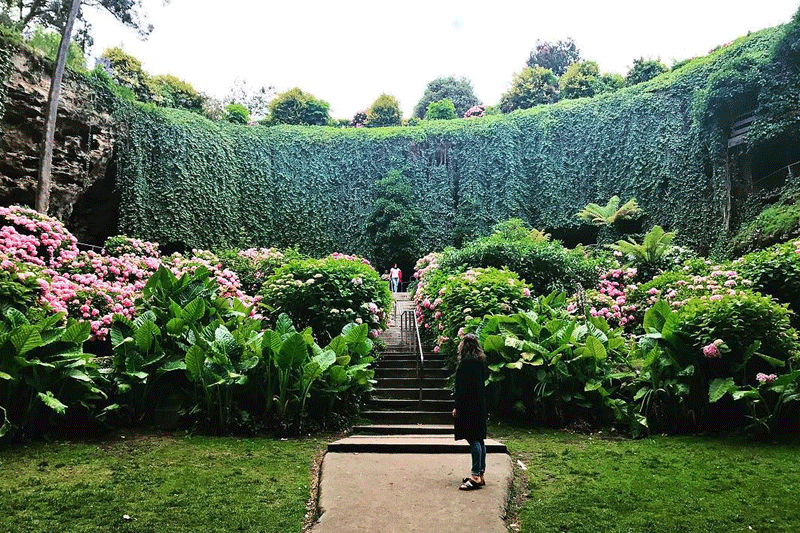
Mt Gambier to Adelaide
434.1 km via Riddoch Hwy/A66 and National Highway A8 , about 5 hours
Adelaide is the capital city of the state of South Australia, and
the fifth-most populous city of Australia. In June 2016, Adelaide
had an estimated resident population of 1,326,354. South Australia,
with a total of 1.7 million inhabitants, has the most centralised
population of any state in Australia, with more than 75 percent
of its people living in greater Adelaide, while the other population
centres in the state are relatively small. Adelaide is north of
the Fleurieu Peninsula, on the Adelaide Plains between the Gulf
St Vincent and the low-lying Mount Lofty Ranges which surround the
city. Adelaide stretches 20 km (12 mi) from the coast to the foothills,
and 94 to 104 km (58 to 65 mi) from Gawler at its northern extent
to Sellicks Beach in the south.
http://southaustralia.com/places-to-go/adelaide
| Distances are coutesy of http://www.distandco.com/
![]()
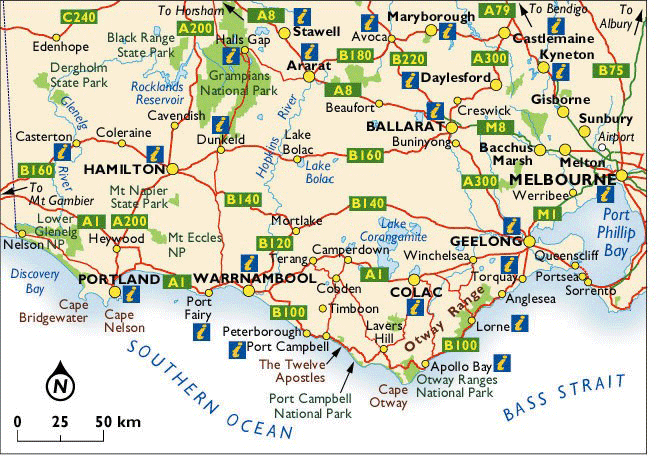
![]()
Courtesy and very special thanks to http://www.visitvictoria.com/
Back to home and more Victoria
tourist destinations
-
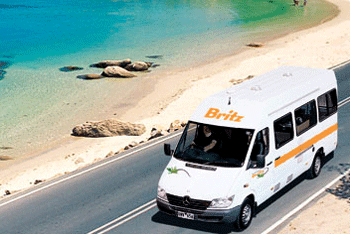
2 Berth camper hire
2 Berth Camper hire from Melbourne, Victoria, Australia. - We have a wide selection of campers for rent from Melbourne CBD with our main suppliers being Mighty, Apollo, Cheapa, Britz, Starr and Maui. Part of the A4WDR group we are one of the oldest specialist agents in Australia.
Check for availability and book now for you camper holiday -
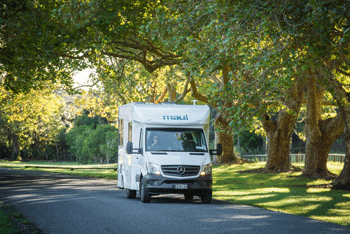
4 Berth motorhome hire
4 Berth Camper hire from Melbourne, Victoria, Australia. - We have a wide selection of campers for hire with kitchens and toilet and shower. Hiring a Motorhome from melbourne you should allow 5 to 7 days minimum as there are numerous great places to see.
See our campervan range and get a quote here -
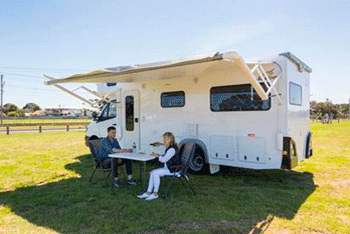
6 Berth RV motor homes
6 Berth Camper hire from Melbourne, Victoria, Australia. - See a vast range from new premium brands such as Starr and Maui to most popular brands usually 1-3 years old at Britz and Apollo. See the budget economical ranges of Mighty and Cheapa.
Get a motorhome quote and our best price here
-
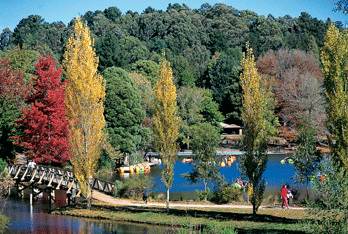
Dandenongs
Self drive RV motorhome hire to Emerald lake, Cardinia Reservoir, Monbulk, Silvan and flower and fruit growing areas. See Puffy Bill Train.
Visit the Dandenongs
-
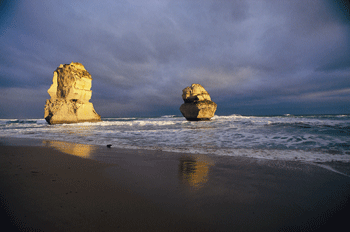
Great Ocean Road
Victoria's great Ocean Road Region and a favourite scenic route for motorhome rentals from Melbourne. See the Otways with walks & waterfalls.
Travel the Great Ocean Road -
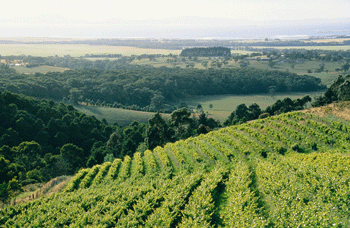
Yarra Valley
The Yarra Valley is the must see and do a trip to melbourne. Craft cottage towns Yarra Junction & Warburton. To vineyards & wineries of Yarra Glen.
Melbourne to the Yarra Valley
-
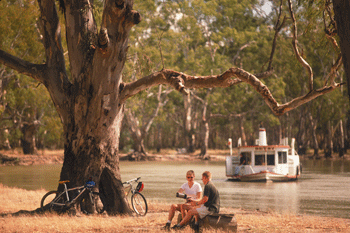
The Murray River
The Murray River accessible by camper from Melbournes. Ride on an historic paddle steamer, captain your own houseboat.
The Might Murray River -
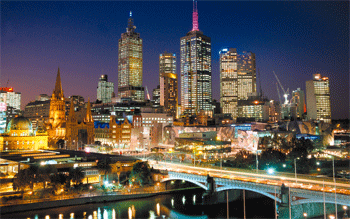
Accommodation
Melbourne need accommodation in Victoria. Wotif Search, plan & book - flights, hotels, packages, activities all here.
Accommodation specials with instant booking -
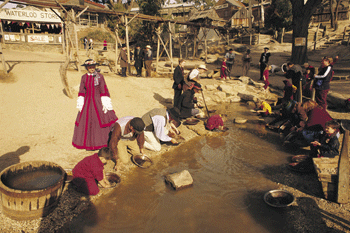
Sovereign Hill
Experience the rich history of the Goldfields. Discover Victoria's stunning architecture and charming country towns.
Sovereign Hill Ballarat